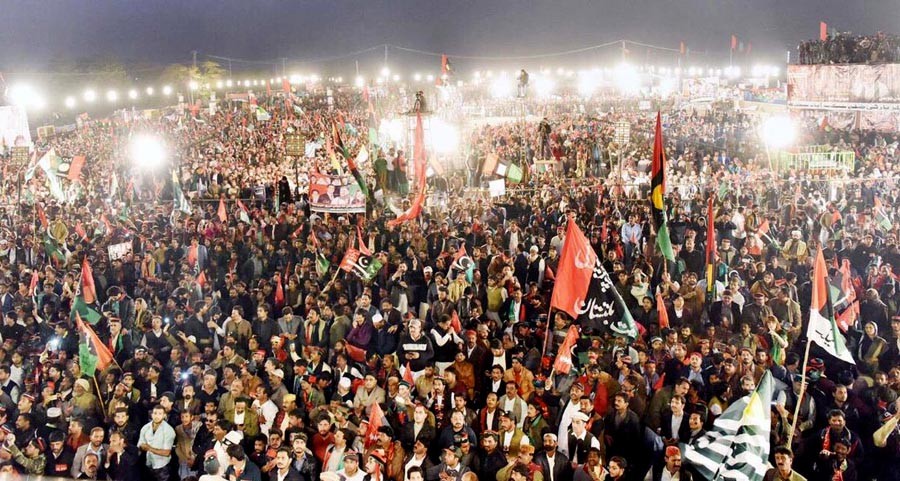
History in Pakistan does not return favourable judgment on political parties playing the establishment game. Clearly, this is not the PPP’s finest hour

On December 5, 2017 Pakistan People’s Party (PPP) organised its rally at the Parade Ground Islamabad to mark 50 years of its founding. The rally was a big power show for the party after a long time.
The choice of the venue was, however symbolic as it represented a huge shift in the party’s journey and policy. Throughout its history, the PPP has placed its credibility on organising its rallies among the shirtless and the unwashed in the historic venue of Liaquat Bagh, Rawalpindi, which is an open public space. It was here that Benazir Bhutto addressed her last rally minutes before she was assassinated.
Zulfikar Ali Bhutto also used to address public rallies at this Bagh. In due course of time, he probably came to see himself as the master of Liaquat Bagh since his hold on masses was undoubtedly deep and instant. So much so that he could not countenance rival opposition rallies in the same public space. Perhaps that is why the opposition rally (of Awami National Party) at the Liaquat Bagh was fired upon on March 23, 1973, since the opposition was perceived to be encroaching on his turf.
This identification with the Liaquat Bagh added to PPP’s credentials and burnished its image among the grassroots and ordinary toiling masses all through its existence. Not anymore. Fifty years on, the PPP seems to have moved away from its notional adherence to the idea of mass politics as represented in its choice of the Parade Ground for its 50th anniversary.
Unlike Liaquat Bagh, the Parade Ground, where the PPP organised its rally, is a sanitised space controlled by the establishment. This is a space where only anointed leaders are permitted to parade their anointed political wares. In recent years, the Parade Ground has been the favourite venue for the Pakistan Tehreek-e-Insaf (PTI) meetings. The fact that the PPP staged its rally at the PTI’s favoured venue says a lot about the convergence of two parties’ tactics in dislodging and weakening the Pakistan Muslim League-Nawaz (PML-N) which has been seen to be stridently anti-establishment in recent years.
The PPP’s pro-establishment orientation was further confirmed in its participation in the opposition rally in Lahore where the PPP teamed up with the PTI and Pakistan Awami Tehreek (PAT) and other parties to dislodge the government. It is another matter though that the supersized ego of Imran Khan could not reciprocate the PPP’s outstretched hand to walk hand in hand into the establishment’s fold.
The PPP further confirmed its journey in the pro-establishment direction by engaging in the plot to oust the PML-N led government in Balochistan in order to stop the PML-N juggernaut in the Senate election. The plot was later on owned up by the PPP’s Co-Chairman and former President Asif Ali Zardari with a great deal of pride. The Charter of Democracy was finally laid to rest with this act.
The PPP is so puffed up with support from some sections of the establishment that the party has not shied away from making a bold claim of rustling up a few Senate seats from Balochistan as a payback for this coup-plotting and executing services, even though the PPP has no MPA in the assembly.
This shift represents the apogee of the politics of tactics at the expense of the politics of ideology. Asif Ali Zardari inaugurated this politics and took immense delight in its operations. Up to a point, this quality served him well in seeing the PPP through its first terms against machinations and intrigues. Yet the politics of tactics hollowed out the party known as the party of the masses and the poor.
This new-style politics suited Zardari’s temperament and his style which is not calibrated to public speaking and mass mobilisation politics which characterised both Benazir and her father. For both, the sight of the shirtless and the poor congregated in mass rallies afforded an adrenaline. This bond with the masses gave the party its élan and mass appeal which remained undimmed until Zardari’s assumption of the party command.
As a result of the primacy of the politics of tactics, the party has been confined to Sindh with both Punjab and KP becoming PPP-free areas. Even during the 2013 election, the PPP seemed to have opted to stay pretty much out of serious contention in Punjab. The party’s campaign was led by Manzoor Wattoo widely hated by the party’s rank and file. The party stalwarts, Aitzaz Ahsan and Qamar Zaman Kaira, were kept off the scene with the party punching way below its political and ideological weight.
The politics of tactics is now concentrating on regaining some representative hold in the provinces of Punjab, KP and Balochistan -- through a combination of conspiracy-hatching, horse-trading and establishment-prodding techniques. This may do lasting harm to the party, its image and appeal. There are no longer effective party organisations in the rest of the county. It is only in Sindh that the party, thanks to its occupation of office and lack of effective opposition, enjoys some semblance of local party activity. In the rest of the country, the PPP has been wiped out.
The exit of the party from the rest of Pakistan has opened up a huge vacuum in the social democratic space. At a time when the country desperately needs a radical platform to address the pressing issues of privatisation, deteriorating public services and gross income inequalities, the PPP has taken the wrong road to oblivion.
This is a moment of strange political role reversal whereby the solidly pro-establishment party, the PML-N, is opting for an anti-establishment stance while the PPP, historically anti-establishment, is turning pro-establishment. Clearly, this is not the PPP’s finest hour. History in Pakistan does not return favourable judgment on political parties playing the establishment game.
Can Zardari escape this judgment?